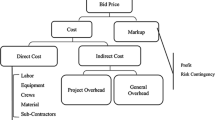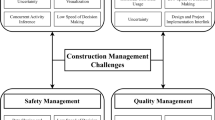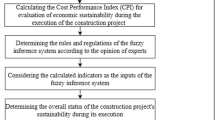Abstract
In general, the performance of a particular construction project can be evaluated by how many of the project goals are achieved in terms of cost, time, quality, safety, environment, and so forth. However, in the construction industry, which is characterized as project specific, a clear delineation of scope of performance is absent, and the standard procedure and operations are not fully developed. Thus, it is very difficult to assess an overall performance level of a constructed project in a reasonable manner. The objective of this research is to define a quantitative performance measurement system and establish the evaluation criteria by identifying 18 key performance indicators, focusing on residential building projects. Based on the performance assessment methodology, 22 project cases have been collected for comparative analysis and have been evaluated to determine whether the system is applicable to the potential projects. The set of identified performance indicators is also useful in developing a customized performance measurement system for a particular type of project. The research findings are expected to encourage the project stakeholders to develop a performance-based project control system, thereby enhancing their level of satisfaction.
Similar content being viewed by others
References
Alarcon, L. F. and Ashley, D. B. (1996). “Modeling project performance for decision making.” ASCE J. Constr. Eng. Manage., Vol. 122, No. 3, pp. 265–273.
Cha, H. and Kim, T. (2008). “Developing measurement system for key performance indicators on building construction projects.” KICEM J. of Constr. Mgmt., Vol. 9, No. 4, pp. 120–130 (in Korean).
Cha, H. and O’Connor, J. T. (2006). “Characteristics for leveraging value management processes on capital facility projects.” ASCE J. of Mgmt Engr. Vol. 22, No. 3, pp. 135–147.
Chan, A. P. C., Scott, D., and Chan, A. P. L. (2004). “Factors affecting the success of a construction project.” ASCE J. Constr. Eng. Manage., Vol. 130, No. 1, pp. 153–155.
Constructing Excellence (CE) (2006). Industry performance report 2006, CE, London, U.K.
Construction Industry Institute (CII) (2001). CII benchmarking and metrics data report 2001, CII, Austin, Tex.
Construction Industry Institute (CII) (2008). Benchmarking & metrics project level survey version 10.3, Austin, Tex.
Costa, D. B., Formoso, C. T., Kagioglou, M., and Alarcon, L. F. (2004). “Performance measurement system for benchmarking in the construction industry.” Proc. 12th IGLC Conf., LO-School, Elsinore, Denmark, pp. 451–463.
Cox, R. F., Issa, R. R. A., and Ahrens, D. (2003) “Management’s perception of key performance indicators for construction.” ASCE J. Constr. Eng. Manage., Vol. 129, pp. 2, pp. 142–151.
Egan, J. (1997). Rethinking construction, Construction Task Force, London.
Hwang, B., Thomas, S., and Caldas, C. (2010). “Performance metric development for pharmaceutical construction projects.” Int. J. of Proj. Mgmt, Vol. 28, No. 3, pp. 265–274.
Jung, S., Kim, Y., Jin, S. and Yoon, S. (2005). “A proposal on the assessment criteria and conceptual methodology of performance measurement based on efficiency through construction project life cycle.” J. of Architectural Institute of Korea, Vol. 21, No. 7, pp. 139–148. (in Korean)
Khaled, M. N., Hordur, G. G., and Mohamed, Y. H.(2005). “Using weibull analysis for evaluation of cost and schedule performance.” ASCE J. Constr. Engrg. and Mgmt., Vol. 131, No. 12, pp. 1257–1262.
Kim, W., Koo, K., and Hyun, C. (2003). “A study on the selection of post-evaluation factors for the building construction.” J. of Architectural Institute of Korea, Vol. 19, No. 12, pp. 171–178. (in Korean)
O’Connor, J. T. and Yang, L. (2004). “Project performance vs. use of technologies at the project- and phase-levels.” ASCE J. Constr. Eng. Manage., Vol. 130, No. 3, pp. 322–329.
Shin, Y., and Kim, H. (2004). “Performance measurement techniques and best practice in construction projects.” J. of Architectural Institute of Korea, Vol.20, No. 3, pp. 109–116. (in Korean)
Song, S., Lee, H., and Park, M. (2006). “Quality performance management system for construction projects using quality performance indicators.” KICEM J. of Const. Mgmt., Vol. 7, No. 3, pp. 76–85. (in Korean)
Yu, I., Kim, K., Jung, Y. and Chin, S. (2007). “Comparable performance measurement system for construction companies.” ASCE J. of Mgmt. Engr., Vol. 23, No. 3, pp. 131–139.
Author information
Authors and Affiliations
Corresponding authors
Rights and permissions
About this article
Cite this article
Cha, H.S., Kim, C.K. Quantitative approach for project performance measurement on building construction in South Korea. KSCE J Civ Eng 15, 1319–1328 (2011). https://doi.org/10.1007/s12205-011-1323-5
Received:
Revised:
Accepted:
Published:
Issue Date:
DOI: https://doi.org/10.1007/s12205-011-1323-5




